Related Research Articles
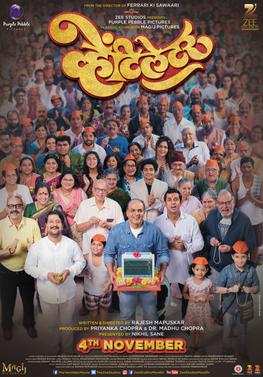
Ventilator is a 2016 Indian Marathi-language comedy drama film written and directed by Rajesh Mapuskar and produced by Priyanka Chopra. The film features an ensemble cast of more than 100 actors, including Ashutosh Gowariker, Jitendra Joshi, Sulbha Arya and Sukanya Kulkarni. It tells the story of the Kamerkar family, whose eldest and most beloved member goes into a coma and is put on a medical ventilator a few days before the Ganesh Chaturthi festival celebrations.
Sudhir Phadke was an Indian singer-composer. He is regarded as an icon of the Marathi film industry and Marathi Sugam Sangeet with a legacy spanning five decades. Apart from Marathi, Phadke sang and composed songs in several Hindi films as well.
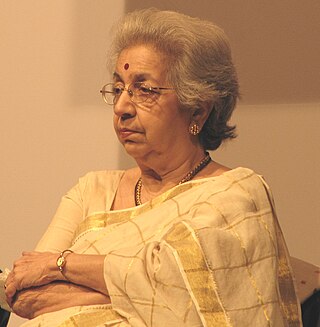
Vijaya Mehta, is a noted Indian Marathi film and theatre director and also an actor in many films from the Parallel Cinema. She is a founder member of Mumbai-based theatre group, Rangayan with playwright Vijay Tendulkar, and actors Arvind Deshpande and Shriram Lagoo. She is most known for her acclaimed role in film Party (1984) and for her directorial ventures, Rao Saheb (1986) and Pestonjee (1988). As the founder member of theatre group, Rangayan, she became a leading figure in the experimental Marathi theatre of the 1960s.
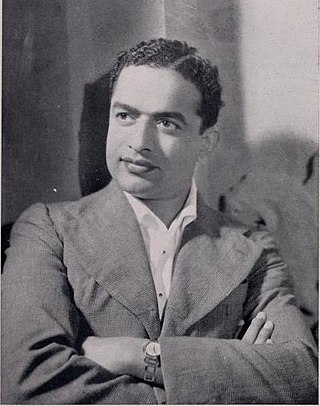
Shantaram Rajaram Vankudre, also known as V. Shantaram or Shantaram Bapu, was an Indian film director, film producer, screenwriter and actor known for his work in Hindi and Marathi films. He is best known for films such as Dr. Kotnis Ki Amar Kahani (1946), Amar Bhoopali (1951), Jhanak Jhanak Payal Baaje (1955), Do Aankhen Barah Haath (1957), Navrang (1959), Duniya Na Mane (1937), Pinjara (1972), Chani, Iye Marathiche Nagari and Zunj.

Vikram Gokhale was an Indian film, television and stage actor, noted for his roles in Marathi theatre, Hindi films and television. He was the son of the Veteran Marathi theatre and film actor, Chandrakant Gokhale.

Nandini Karnataki, known mononymously as Nanda, was an Indian actress who appeared in Hindi and Marathi films. Regarded as one of the finest actresses of Indian cinema, her career spanned over 30 years. She is best known for her performances in Chhoti Bahen, Dhool Ka Phool, Bhabhi, Kala Bazar, Kanoon, Hum Dono, Jab Jab Phool Khile, Gumnaam, Ittefaq, The Train and Prem Rog.

Marathi Cinema, also known as Marathi film industry, is the segment of Indian cinema dedicated to the production of motion pictures in the Marathi language widely spoken in the state of Maharashtra. It is based in Mumbai. It is the oldest film industry of India and one of the leaders in filmmaking in the Indian film industry.

Prabhat Film Company was an Indian film production company and film studios founded in 1929 by the noted film director V.Shantaram and his friends.
![<i>Kunku</i> 1937 [[British Raj]] film](https://upload.wikimedia.org/wikipedia/commons/3/33/Duniya_Na_Mane_%28Hindi%29_1937.jpg)
Kunku is a 1937 Marathi classic social drama film directed by V. Shantaram, and based on the novel, Na Patnari Goshta by Narayan Hari Apte, who also wrote film's screenplay. The film was simultaneously shot and released in Hindi as Duniya Na Maane.

The 9th Cannes Film Festival was held from 23 April to 10 May 1956. The Palme d'Or went to The Silent World by Jacques-Yves Cousteau and Louis Malle. The festival opened with Marie-Antoinette reine de France, directed by Jean Delannoy and closed with Il tetto by Vittorio De Sica.
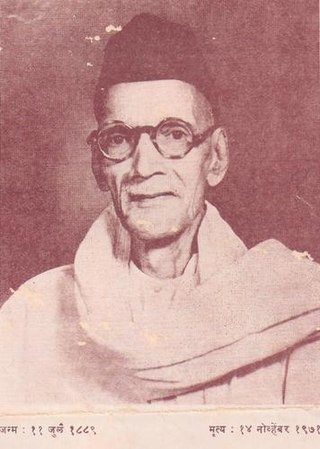
Narayan Hari Apte, popularly known as Nanasaheb Apte was a Marathi popular novelist, writer of advice books and editor from Maharashtra, India.

Amar Bhoopali is a 1951 Indian Marathi language film, produced and directed by V. Shantaram and written by Vishram Bedekar. It is a true story about a simple cow herder who has an innate gift of poetry, set in the waning days of the Maratha confederacy, c. early 19th century. It is an ode to the saffron flag of Marathas, calling on people to rise again against the foreign enemy. It competed for the Grand Prize of the Festival at the 1952 Cannes Film Festival.
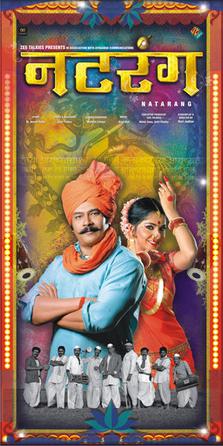
Natarang, also spelled Natrang, is a 2010 Indian Marathi-language drama film directed by debutant Ravi Jadhav and starring Atul Kulkarni and Sonalee Kulkarni. Composer duo Ajay–Atul composed the original score and songs of the film.

Sandhya Shantaram known mononyomusly as Sandhya is an Indian actress. She is best known for her appearances in various Hindi and Marathi films directed by her husband V. Shantaram, in 1950s-1960s, most notably Jhanak Jhanak Payal Baaje (1955), Do Aankhen Barah Haath (1958), Navrang (1959), Marathi film Pinjra (1972) and Amar Bhoopali (1951).
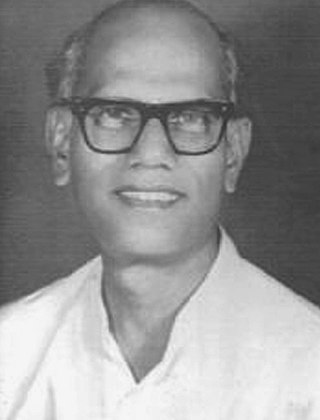
Shantaram Govind Athavale was an Indian director of Marathi, Hindi and English language films, a lyricist, poet, and author. Part of the generation that emerged from the Prabhat Film Company in Pune in the 1930s, he made pioneering contributions to Marathi film.
Rao Saheb is a 1985 Hindi period drama film directed by Vijaya Mehta, a noted theatre director. It is based on a Marathi novel Andharachya Parambya by Jaywant Dalvi, on which he also wrote the play Barrister. The film set in small rural town in Maharashtra in early 19th century, and deals with clash of progressives and orthodox traditions, while depicting plight of women especially widows in traditional Indian society under feudalism and oppressive patriarchy. The film starred Anupam Kher, Vijaya Mehta, Nilu Phule, and Tanvi Azmi.

Chandrasena is a 1935 Hindi/Marathi mythology drama film directed by V. Shantaram for his Prabhat Film Company. The film was the first Indian trilingual film to be made simultaneously in Hindi, Marathi. The cinematographer was K. Dhiaber and the story and dialogue were by Shivram Vashikar. The music direction was by Keshavrao Bhole, with lyrics written by K. Narayan Kale. The cast included Nalini Tarkhud, Sureshbabu Mane, Kelkar, Rajani, Shantabai and Azurie.
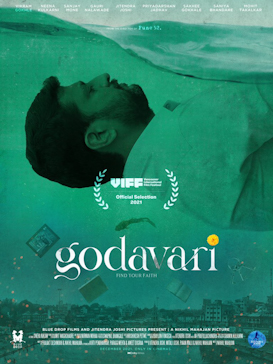
Godavari is an Indian Marathi-language drama film directed by Nikhil Mahajan and produced by Jitendra Joshi, Mitali Joshi, Pavan Malu and Nikhil Mahajan under the banner of Blue Drop Films. Starring Jitendra Joshi in lead role along with Neena Kulkarni, Sanjay Mone, Vikram Gokhale and Gauri Nalawade in pivotal roles. The film tells a story of a family living on the banks of river Godavari in Nashik.

Dattatray Ambadas Mayalu (1932), known as Rajdutt, is an Indian director and producer in the Marathi and Hindi film industries. He directed his first film Madhuchandra in 1967. He is a recipient of three National Film Awards, three Filmfare Award Marathi, twelve Maharashtra State Film Awards, V. Shantaram Award and Zee Gaurav Lifetime Achievement Award for his contribution in Marathi cinema. In 2024, the Government of India, honoured him with Padma Bhushan, India's third highest civilian honour for his contributions to Indian culture through performing arts.
References
- ↑ "शेवग्याच्या शेंगा". मराठी चित्रपट सूची.
- ↑ "Festival de Cannes: Drumsticks". festival-cannes.com. Retrieved 6 February 2009.
- ↑ "Shevagyachya Shenga - Movie - Shantaram Athavale". www.shantaramathavale.com.
- ↑ "3rd National Film Awards" (PDF). Directorate of Film Festivals . Retrieved 1 September 2011.